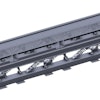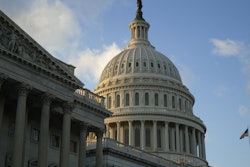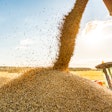
The Senate passed a $1 trillion bipartisan infrastructure plan Tuesday, reportsCNBC.
The legislation,which includes $550 billion in new fundingfor transportation, broadband and utilities, got through in a 69-30 vote, as 19 Republicans joined all 50 Democrats.
TheNational Grain and Feed Association (NGFA)says its members rely on a robust and competitive transportation system, including U.S. highways, bridges, inland waterways, ports and railways, to efficiently and competitively serve domestic and global markets.
"The Infrastructure Investment and Jobs Act will enhance the efficient and cost-effective transport of agricultural and food products resulting in substantial contributions and opportunities for U.S. economic growth and trade," says NGFA President and CEO Mike Seyfert.
The bipartisan legislation would increase infrastructure spending by $550 billion over five years, including an additional $110 billion in U.S. roads and bridges, $65 billion for broadband, and $17.3 billion for ports and waterways. The latter includes $2.5 billion specifically for inland waterways construction projects.
“This bipartisan agreement also includes a number of necessary and overdue provisions designed to boost the resiliency of the agricultural supply chain, including investments in cybersecurity and an apprenticeship pilot program to address the nationwide truck driver shortage,” Seyfert says.
NGFA sent anAug. 9 letterin support of the infrastructure deal to Senate leaders. The association urges swift enactment of the comprehensive infrastructure bill in the House.
American Farm Bureau Federation生机勃勃的杜瓦尔总统还欢呼参议院不是sage of the infrastructure bill.
“The pressing infrastructure issues facing our nation are too important to ignore, particularly in rural communities where modernization is desperately needed," Duvall says.
Duvall also notes that extending digital access to rural America is just as important as paved roads and solid bridges.
"Increased funding to bring broadband to hundreds of thousands of rural communities that currently have no access to the internet will help farmers meet the demands of a growing world while using emerging technologies to build on climate-smart practices," he says.
Kevin Scott,American Soybean Association (ASA)president and soybean farmer from Valley Springs, SD, says that throughout the process, ASA has engaged with lawmakers to express how important these investments in critical infrastructure are to the rural community.
"We appreciate our leaders in Washington addressing the truck driver shortage, expanding broadband connectivity across farm country, and incorporating a pilot project that highlights the benefits of biobased construction materials containing soy," notes Scott.
One ag group, theAmerican Coalition for Ethanol (ACE), however, sees a lack of investment in low carbon biofuels in this infrastructure package.
“The Senate’s infrastructure bill is a missed opportunity to capitalize on ethanol’s ability to deliver significant short- to mid-term gains toward decarbonizing the transportation sector by supporting vehicles and retail infrastructure for higher ethanol blends," says ACE CEO Brian Jennings.
“If Congress wants to achieve immediate climate benefits from clean energy infrastructure, it should provide incentives for retailers to sell E15 and E85 and for automakers to resume the production of flexible fuel vehicles.
"We thank Senators Klobuchar, Fischer, and Ernst for attempting to amend the bipartisan infrastructure legislation with provisions to encourage the use of higher blends of ethanol and ensure E15 can be available year-round," says Jennings. "We urge the House of Representatives to take up these cost-effective provisions when it considers the infrastructure bill.”
CNBC notes that House SpeakerNancy Pelosi, D-Calif., has stressed she will not take up the infrastructure bill or Democrats’ separate proposal to expand the social safety net until the Senate passes both of them. The House does not return from recess until September 20.





















